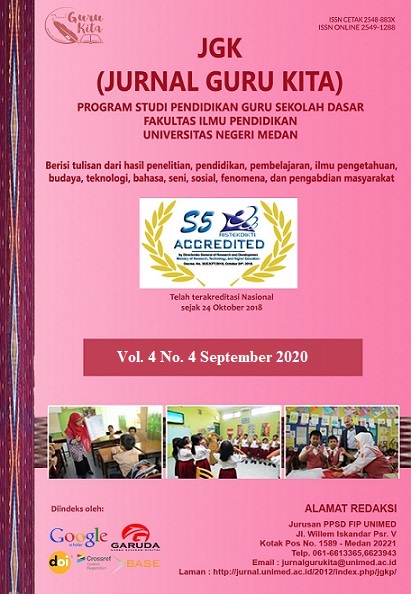ANALISIS PERANAN GURU DALAM MEMBINA KEDISIPLINAN BELAJAR SISWA KELAS IV DI SDIT ZAHRA ASY-SYIFA
DOI:
https://doi.org/10.24114/jgk.v7i1.43313Keywords:
Discipline, learning, The Role of the Teacher.Abstract
Analysis of the Teacher's Role in Fostering Learning Discipline for Class IV Students at SDIT Zahra Asy-Syifa. The purpose of this study was to determine the level of discipline in class IV students through the role of the teacher at SDIT Zahra Asy-Syifa in semester II of the 2021/2022 school year. The subjects in this study were the school principal, homeroom teacher for class IV, some 28 class IV students. This study uses a qualitative methodology with a descriptive approach where the design can be improved at any time depending on the conditions and situation in the field. Then in the data collection process using three data collection techniques namely, participating observation, semi-structured interviews and documentation. As for the data analysis technique using descriptive analysis from Miles and Huberman which consists of data reduction, data presentation, and drawing conclusions. The results of the study reveal that: 1) there is a teacher's role in fostering student learning discipline, namely the teacher as a teacher, mentor, counselor, evaluator and model/exemplar; 2) It turns out that teachers are still having problems in instilling discipline in student learning as seen from two factors, namely: a) students and b) family and the surrounding environment; 3) The teacher makes several efforts in instilling discipline including: a) instilling exemplary behavior, b) giving rewards and punishments, c) reinforcing the application of the rules.References
Abiansyah, Q. (2017). Efektivitas Peran Guru Dalam Membentuk Kedisiplinan Siswa Di MTs Annajah Jakarta. Skripsi. UIN Syarif Hidayatullah Jakarta.
Al-farisi. S. (2021). Pengaruh Keteladanan Guru Terhadap Perilaku Disiplin Siswa Di Madrasah Aliyah As™adiyah Dapoko Kabupaten Bantaeng. Skripsi. Universitas Muhammadiyah Makassar.
Ansori, Y. Z. (2020). œPenguatan Karakter Disiplin Siswa Melalui Peranan Guru Di Sekolah Dasar. Jurnal Elementaria Edukasia. 3(1), 126-135
Aqib, Z (2011). Pendidikan Karakter Membangun Perilaku Positif Anak Bangsa. Bandung: Yrama Widya.
Denti, K. R. (2019). Upaya Guru Pendidikan Agama Islam Dalam Meningkatkan Kedisiplinan Belajar Siswa Kelas X SMK Negeri 1 Tulang Bawang Tengah Kabupaten Tulang Bawang Barat. Skripsi. IAIN METRO
Departemen Pendidikan Nasional. (2005). Undang-Undang Republik Indonesia, Nomor 14 Tahun 2005 Tentang Guru dan Dosen. Depdiknas RI : Jakarta.
Fitri, A. N, dkk. (2016). Peran Orang Tua Dalam Penanaman Disiplin Pada Anak Usia Prasekolah Melalui Pembiasaan Di Kelurahan Cihaurgeulis Bandung. Jurnal FamilyEdu. 2(2), 81-91.
Imron, A. (2011). Manajemen Siswa Berbasis Sekolah. Jakarta: Bumi Aksara.
Kharisma, C dan Suyatno. (2018). œPeran Guru Dalam Menanamkan Karakteristik Disiplin Siswa Di Sekolah Dasar Negeri Bleber 1 Prambanan Sleman. Fundamental Pendidikan Dasar, 1(2), 131-139.
Muzdalifah. M. (2020). Pengaruh Keteladanan Guru Terhadap Kedisiplinan Siswa Di Mts Miftahul Huda Lehan Kecamatan Bumi Agung Lampung Timur. Skripsi. Institut Agama Islam Negeri Metro
Nugraha, W.A . (2012). Hubungan Kedisiplinan Belajar Di Sekolah Dan Di Rumah Dengan Prestasi Belajar Siswa Kelas IV SD Se-Gugus I Sumberagung Jetis Bantul Tahun Ajaran 2011/2012. Skripsi. UNY.
Nurdin, S dan Adriantoni. (2019). Profesi Keguruan. Depok: Rajawali Press.
Rahmat, N., Sepriadi, dan Daliana, R. (2017). œPembentukan Karakter Disiplin Siswa Melalui Guru Kelas Di Sd Negeri 3 Rejosari Kabupaten Oku Timur. Jurnal Manajemen, Kepemimpinan, dan Supervisi Pendidikan. 2(2), 229-244
Rifai, F. I. (2018). Strategi Self-Management untuk Meningkatkan Kedisiplinan Belajar. Kartasura: CV Sindunata.
Salim dan Rifki, M. I. (2021). Metodologi Penelitian Kualitatif. Bandung: Citapustaka Media
Salminawati. (2019). œImplementasi Reward Dan Punishment Dalam Pembelajaran Di Madrasah Se-Kota Medan. Jurnal Al- Fatih: Jurnal Pendidikan dan Keislaman. 2(1). 1-13.
Saputri, S. (2021) Hubungan Antara Kesadaran Diri (Self Awareness) Dengan Disiplin Belajar Pada Siswa Kelas IVIII Di Mts Negeri 2 Kota Jambi. Thesis. Universitas Jambi.
Sari, Y.N. (2015). Faktor Penyebab Dan Dampak Negatif Menyontek Bagi Siswa Sekolah Menengah Pertama (Studi Kasus Di SMP Suka Maju Surakarta Tahun Pelajaran 2014/2015). Skripsi. Universitas Muhammadiyah Surakarta
Sugono, D. (2008). Kamus Bahasa Indonesia. Jakarta: Pusat Bahasa Departemen Pendidikan Nasional
Sunarsih, S. S. (2016). Pengaruh Peran Guru dan Kedisiplinan Siswa Terhadap Prestasi Belajar Siswa Kelas IV SD Sekolah Binaan 1 Kecamatan Brebes Kabupaten Brebes. Skripsi. UNNES.
Taha, R. A. (2021). œPengaruh Penerapan Tata Tertib Sekolah terhadap Disiplin Belajar Siswa. Ekuitas: Jurnal Pendidikan Ekonomi. 9(2). 247-253
Tu™u. T. (2006). Peran Disiplin pada Perilaku dan Prestasi Belajar. Jakarta: Grasindos.
Wahyu Ardian Nugraha. (2012). Hubungan Kedisiplinan Belajar Di Sekolah Dan Di Rumah Dengan Prestasi Belajar Siswa Kelas IV SD Se-Gugus I Sumberagung Jetis Bantul Tahun Ajaran 2011/2012. Skripsi. UNY.
Wiyani, A.N. (2013). Manajemen Kelas (Teori dan Aplikasi Untuk Menciptakan Kelas Kondusif). Yogyakarta: Ar- Ruzz Media.
Downloads
Published
How to Cite
Issue
Section
License
Authors published with the JGK (Jurnal Guru Kita) agree to the following terms:
- Authors retain copyright and grant the journal the right of first publication with the work simultaneously licensed under a Creative Commons Attribution License (CC BY-SA 4.0) that allows others to share the work with an acknowledgment of the work's authorship and initial publication in this journal.
- Authors are able to enter into separate, additional contractual arrangements for the non-exclusive distribution of the journal's published version of the work (e.g., post it to an institutional repository or publish it in a book), with an acknowledgment of its initial publication in this journal.
- Authors are permitted and encouraged to post their work online (e.g., in institutional repositories or on their website) prior to and during the submission process, as it can lead to productive exchanges, as well as earlier and greater citation of published work. (See The Effect of Open Access)













